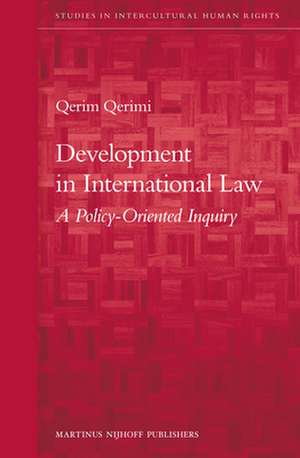Development in International Law: A Policy-Oriented Inquiry: Studies in Intercultural Human Rights, cartea 3
Autor Qerim Qerimien Limba Engleză Hardback – 15 mai 2012
Preț: 880.35 lei
Preț vechi: 1073.60 lei
-18% Nou
Puncte Express: 1321
Preț estimativ în valută:
168.45€ • 183.56$ • 141.95£
168.45€ • 183.56$ • 141.95£
Carte indisponibilă temporar
Doresc să fiu notificat când acest titlu va fi disponibil:
Se trimite...
Preluare comenzi: 021 569.72.76
Specificații
ISBN-13: 9789004202948
ISBN-10: 9004202943
Pagini: 304
Dimensiuni: 155 x 235 x 23 mm
Greutate: 0.64 kg
Editura: Brill
Colecția Brill | Nijhoff
Seria Studies in Intercultural Human Rights
ISBN-10: 9004202943
Pagini: 304
Dimensiuni: 155 x 235 x 23 mm
Greutate: 0.64 kg
Editura: Brill
Colecția Brill | Nijhoff
Seria Studies in Intercultural Human Rights
Notă biografică
Qerim Qerimi, Doctor of the Science of Law (J.S.D.) in Intercultural Human Rights summa cum laude (2010) and LL.M. cum laude (2005), St. Thomas University School of Law, Miami, Florida; B.A. and J.D., Universities of Prishtina, Kosovo, and Utrecht, The Netherlands, is a Professor of Law at the University of Prishtina and a former Visiting Research Scholar at Harvard. Widely published, he has served as advisor to the European Union, USAID and the World Bank on issues related to development and international law.
Recenzii
"’Development in International Law’ stands to reorient conventional thinking about what it means to help every country and person develop. Not content to merely show the limitations of past decisions that promoted a narrow conception of development, Dr. Qerimi proposes international policies that focus on all human rights to more fully implement his broad conception of development. An enriching read for every scholar, policy-maker and lawyer interested in this field."
TAI-HENG CHENG, Professor of Law and Co-Director, Institute for Global Law, Justice, & Policy, New York Law School
“Few works from the world of international development advance the individual with all attendant values within a world order of human dignity. As such, this book is a serious contribution to legal scholarship and the practice of international development.” — CHARLES H. NORCHI, Professor of Law and Director, Center for Oceans and Coastal Law, University of Maine School of Law
TAI-HENG CHENG, Professor of Law and Co-Director, Institute for Global Law, Justice, & Policy, New York Law School
“Few works from the world of international development advance the individual with all attendant values within a world order of human dignity. As such, this book is a serious contribution to legal scholarship and the practice of international development.” — CHARLES H. NORCHI, Professor of Law and Director, Center for Oceans and Coastal Law, University of Maine School of Law
Cuprins
Foreword; Overview; Acknowledgments; Abbreviations and Acronyms; Introduction;
Part One Delimitation of Problem and Clarification of Goals
A. Foundational Issues: Introducing Basic Concepts and Methods
B. The Development of Development Discussion
Part Two Conflicting Claims and Perspectives on Development
A. Describing the Process of Claims
B. Formulation of Specific Claim
Part Three Past Trends in Decision and Conditioning Factors
A. Origins of the Right to Development: History, Content and Controversy
B. Legal and Policy Decisions on the Right to Development
Part Four Projection of Future Trends in Decision
A. Trend Projection: Difficulty, Need and Utility
B. Probable Future Trends in Development Decision-making
C. More Specific Developmental Constructs
Part Five Appraisal, Alternative Solutions and Recommendations in the Global Common Interest: A Holistic Concept of Development
A. Appraisal
B. Maximum Access by All to the Shaping and Sharing of Empirically Grounded Values of Human Dignity
C. Implementation: The Six Is System
D. Recommended Specific Solutions: Decision Processes
E. Functional Phases of Decision-making and Execution of Development Policies
Part Six Conclusion
Bibliography
Appendices:
I Development-Related Instruments
Annex 1 Declaration on the Right to Development
Annex 2 Rio Declaration on the Environment and Development
Annex 3 United Nations Millennium Declaration
Annex 4 New Delhi Declaration of Principles of International Law Relating to Sustainable Development
II Statistical Appendices
Table 1 Index of Democracy 2008
Table 2 Democracy Index 2008 by regime type
Table 3 The 2010 Index of Economic Freedom
Table 4 2010 Index of Economic Freedom World Rankings
Table 5 Index of Freedom in the World 2010
Index.
Part One Delimitation of Problem and Clarification of Goals
A. Foundational Issues: Introducing Basic Concepts and Methods
B. The Development of Development Discussion
Part Two Conflicting Claims and Perspectives on Development
A. Describing the Process of Claims
B. Formulation of Specific Claim
Part Three Past Trends in Decision and Conditioning Factors
A. Origins of the Right to Development: History, Content and Controversy
B. Legal and Policy Decisions on the Right to Development
Part Four Projection of Future Trends in Decision
A. Trend Projection: Difficulty, Need and Utility
B. Probable Future Trends in Development Decision-making
C. More Specific Developmental Constructs
Part Five Appraisal, Alternative Solutions and Recommendations in the Global Common Interest: A Holistic Concept of Development
A. Appraisal
B. Maximum Access by All to the Shaping and Sharing of Empirically Grounded Values of Human Dignity
C. Implementation: The Six Is System
D. Recommended Specific Solutions: Decision Processes
E. Functional Phases of Decision-making and Execution of Development Policies
Part Six Conclusion
Bibliography
Appendices:
I Development-Related Instruments
Annex 1 Declaration on the Right to Development
Annex 2 Rio Declaration on the Environment and Development
Annex 3 United Nations Millennium Declaration
Annex 4 New Delhi Declaration of Principles of International Law Relating to Sustainable Development
II Statistical Appendices
Table 1 Index of Democracy 2008
Table 2 Democracy Index 2008 by regime type
Table 3 The 2010 Index of Economic Freedom
Table 4 2010 Index of Economic Freedom World Rankings
Table 5 Index of Freedom in the World 2010
Index.









